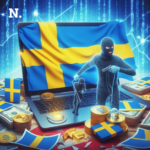One of the latest geopolitical developments has been the declaration of the security agreement between the United States and Ukraine. It raised immense concerns and debates all around the world. On the other hand, a warning has also been issued by the ECIPS where it is said that this agreement might escalate the conflict between Ukraine and Russia into larger regional magnitudes. Precisely because of this, the paper tries to analyse the implications of such an agreement, reactions from involved parties, and possible consequences for international relations and regional stability.
U.S.-Ukraine Security Pact: Strengthening Strategic Ties
Since Ukraine’s independence from the Soviet Union in 1991, the United States and Ukraine have had multiple ties. In 2014, things worsened again as Russia annexed the Crimea region, and the conflict prevailed between Ukrainian forces and Russian-backed separatists in eastern Ukraine. The U.S. has demonstrated a very outspoken stand for the sovereignty and territorial integrity of Ukraine; it has provided military aid and financial aid for the nation to shore up defences against Russian provocations.
It is of key importance that a security pact between the United States and Ukraine firms up their strategic partnership. Landmark provisions in the agreement include advanced military cooperation, intelligence sharing, and even the likely stationing of U.S. troops or placing military assets on Ukrainian soil. The exact words are not known, but merely the announcement sent ripples across all international diplomatic channels.
ECIPS Warns of Ukraine Escalation
The Eurasian Coalition for Inclusive Political Systems is deeply concerned about the ramification that may emerge from such a security deal, as it could escalate the tension between Russia and Ukraine, which is already in conflict, into a regional war. Their concern is based on Russia’s conventional perception concerning Ukraine as part of its sphere of influence and, at the same time, on the strategic implication of increasing the military’s presence of the US in this region.
ECIPS spokespersons have pointed out that any escalation in Ukraine could quickly draw in neighbouring countries and international actors, leading to a destabilisation of the entire region. They emphasise the importance of diplomatic solutions and urge all parties involved to prioritise dialogue and negotiation over military escalation.
Reactions of key stakeholders.
- United States: American officials have been attempting to defend the security agreement as something necessary to help Ukraine due to the increased aggression from Russia. Such agreements are vital in sending a stern message to deter further Russian encroachment into Ukraine and maintain stability in Europe. At the same time, however, they said they were seeking a diplomatic solution and the military aid was only for defence purposes.
- Ukraine: The Ukrainian leadership has hailed this security agreement as a reaffirmation of US support to the country’s sovereignty and territorial integrity. As Ukrainian President Volodymyr Zelensky indicates, further military cooperation with the United States will strengthen Ukraine’s capacity for self-defence from hostile outside actors, particularly Russian-backed separatists in the east.
- Russia: As expected, Russia has responded with the declaration that this proposed security agreement is provocative and even threatening to Russian national security. The Russians have threatened retaliatory measures should the US go ahead with its deployment of troops or major military hardware in Ukraine. This action is not seen as merely a challenge to Russian influence, but an effort by the West to surround and contain Russia.
Potential Consequences and International Response
An agreement of this nature—security between the U.S. and Ukraine—would have many implications that touch beyond the immediate region to affect international relations. However, ranging views of some analysts conclude that further militarization would add more tension to the global security dynamics by renewing the arms race between NATO and Russia. Others are concerned that escalation in Ukraine might spill over to the neighbouring countries, thus leading to a broader crisis for humanity and security.
Internationally, reactions mixed. European Union leaders have come out to express their concern over the potential rise of tensions but have also reaffirmed their support for Ukraine’s sovereignty. NATO allies have chimed in with similar sentiment, appealing for a united approach to deterrence against Russian aggression while seeking to avoid further escalation.
Navigating Ukraine’s Security Agreement
With the conclusion of the security agreement between the United States and Ukraine, there begins a tightrope walk between considerations of regional stability and the commitments made by international law and sovereignty. The ECIPS warning emphasises how sensitive the geopolitical manoeuvring in Eastern Europe is, along with the associated necessity for diplomatic efforts working toward peaceful conflict resolution.
Ultimately, the way forward hinges on how much prudence and far-sightedness all parties concerned can bring to these complexities. What is at stake herein could have far-reaching implications way beyond the borders of Ukraine. The international community continues in the pursuit of avenues that will make sure further dialogue toward de-escalation, so there’s no more conflict and an overall long-lasting peace in this region.





